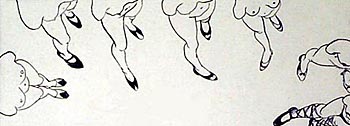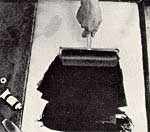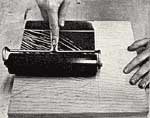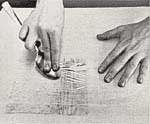Printmaking Definitions: Relief Prints
Intaglio / Etching | Drypoint | Lithography | Relief Printing | Screen Collograph | Cyannotypes | Viscosity Printing
(Wood cuts, Lino prints) - Printing the Relief Plate
The relief process is the oldest printmaking process and comes from China, along with papermaking (approx. 840 AD)
Areas of the plate, which can be wood or linoleum, that are to remain white are cut away with sharp knives and carving tools.
Areas remaining are inked with a brayer, (see examples to the right of this text) and a spoon or press is used to transfer the image to the paper.
Thin Japanese washi or paper made from plant fibres is often used in this process as it is quite receptive to the ink.
 Colour Relief print by Gisele (left) In this print the black plate is cut out but printed along with the colour plates.
Colour Relief print by Gisele (left) In this print the black plate is cut out but printed along with the colour plates.
 A close-up of the vinyl plate for the print above
A close-up of the vinyl plate for the print above
In the colour relief print the complete edition is printed first, then more layers are removed, and printed over top the existing prints.
For example the black is the first layer, then bue green, then the pinks etc. are last. The intaglio print at the top was printed at the same time as the black plate which is a cut plate method.
Illustrations
Rolling out ink on a slab or glass using a brayer or roller
Rolling the ink onto the wood plate that has some areas removed. Note how the ink does not go below the surface.
A thin piece of absorbant paper is placed over the plate and a spoon is used to polish the back, transferring the image to the paper.
You tube videos: demonstrations on relief printing
Lino Printing | Tutorial - Eliott Lucas
Skull n roses. time-lapse linocut limited edition - Nick Sinclair
Reductive Printmaking (Linocut 4 colour + white) - Frank Curkovic
Created by Gisele Beaupre ©



